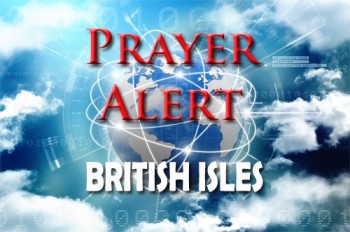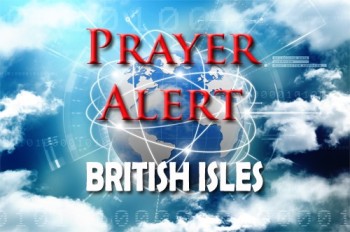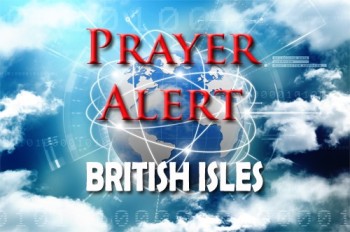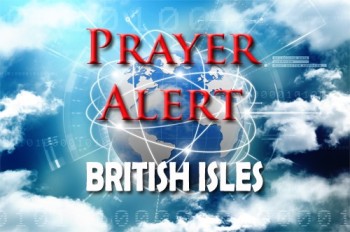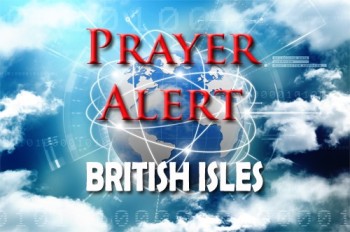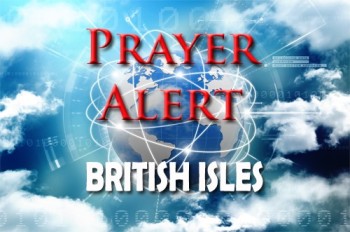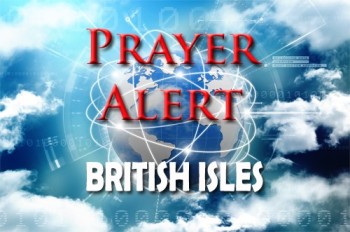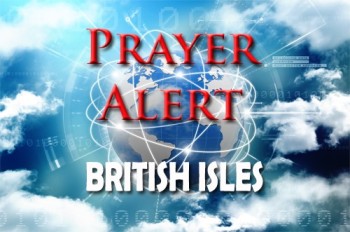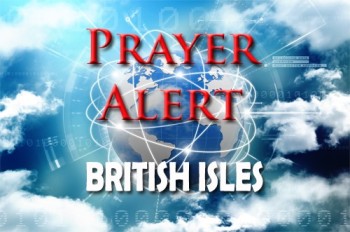Displaying items by tag: British Isles
Prayer for the economy
We pray for peace to cover this nation. We speak hope instead of despair, prosperity instead of lack in finance and the economy; stability to markets, and wisdom to all those making decisions and directives. We agree with James 2:13 (‘Mercy triumphs over judgement’), and repent where our nation as well as our own actions have brought Your judgement upon us. We repent where debt is an accepted norm of society; we repent where we withheld when You asked us to give; we repent where there has been mismanagement, greed and corruption within the very structures of our society, and we ask forgiveness for every place where we as a nation have not stewarded well the resources You gave us. We ask for Your revelatory wisdom to those working at the Treasury and Bank of England. We ask that You connect what needs to be connected and disconnect what needs to be disconnected, so that this nation will be blessed in the year ahead.
Defender of the Faith or defender of faith?
Recently King Charles assured faith leaders from various religions that he would work to protect the space for faith. He stated his duty was ‘to protect the diversity of our country by protecting the space for faith and its practice through religions, cultures, traditions and beliefs to which our hearts and minds direct us’. As a member of the Church of England, his beliefs had love at their heart, so he would respect those who follow other spiritual paths, as well as those who seek to live in accordance with secular ideals. His mother, at her coronation, swore to do her utmost to maintain the laws of God, the true profession of the Gospel, doing all in her power to maintain the Protestant reformed religion and maintain and preserve the settlement of the Church of England, and its doctrine, worship, discipline and government, as established by English law: see
Abortion landmark: ten million lives lost
It is estimated that on 24 September the ten millionth child would have been killed under the Abortion Act.. Last week the media reported that at 14 weeks’ gestation a child can demonstrate their sense of taste. But this child has no meaningful protection in law for another ten weeks. Babies at 23 weeks, which could be delivered and go on to lead healthy lives, can be killed at the mother’s discretion. Leading abortionists would like this to be offered all the way to birth. There are signs of encouragement for pro-life activists. The morals of abortionists like BPAS are being exposed. Fresh young pro-life campaigns are springing up. March for Life UK had record attendance. Each landmark, each record, each year is a painful reminder that we have not come far enough.
Church criticises Scottish government re prayer vigils
The Scottish government's chief legal officer has come under fire after saying that prayer vigils outside abortion clinics could be 'far more damaging' than verbal protest. Addressing the UK's supreme court about abortion clinics in Northern Ireland, Dorothy Bain KC said she believed ‘standing in judgment’ was just as psychologically damaging for women. She wants prayer vigils to be excluded from ‘buffer zones' - areas where protesting or handing out leaflets are banned - outside abortion clinics. The Catholic Church has labelled Mrs Bain's remarks as ‘absurd and alarming’, and have condemned her comments. Everyone has the right to express and offer our opinion on religious belief, and more importantly, religious practice. The Church said, ‘To be told they can't stand silently in prayer, in this case, outside an abortion clinic or a hospital that carries out abortions is really, frankly, chilling and extremely worrying.’
'Toxic culture' of abuse at NHS hospital
An undercover reporter worked inside the Edenfield Centre caring for people held under the Mental Health Act who are at serious risk of harming themselves or others. With a hidden camera, he filmed staff swearing at patients, taunting and mocking them in vulnerable situations - when they were undressing - and joking about their self-harm. Patients were being unnecessarily restrained as well as being slapped or pinched by staff on some occasions. Some female staff acted in a sexualised way towards male patients. Ten patients were being held in small seclusion rooms, designed for short-term isolation to prevent immediate harm, for days, weeks or even months, with only brief breaks. Patient observations, a crucial safety measure, were being regularly missed, and records falsified. Seven members of staff were seen sleeping on shift. A consultant psychiatrist said the footage showed a ‘toxic culture’ among staff of ‘corruption, perversion, aggression, hostility, and lack of boundaries’, which were undermining patient recovery.
Truss may move UK embassy to Jerusalem
Liz Truss has told Israel’s prime minister, Yair Lapid, she is considering moving Britain’s embassy to Jerusalem. Downing Street said the PM reaffirmed her leadership campaign pledge ‘about her review of the current location of the British embassy in Israel.’ The two met in New York during their visit to the UN General Assembly. Lapid tweeted praise to Truss for considering the move, adding, ‘We will continue to strengthen the partnership between the countries’. 2023 will mark 75 years since the re-establishment of the state of Israel. The recent announcement by the PM could signal a shift in the UK’s foreign policy towards Israel. Britain has embassies in all countries’ capitals except Israel’s. There is a consulate in Jerusalem, but only for Palestinians and not Israelis.
The Queen’s evangelistic sermon
Her Majesty wanted to communicate love and hope through the hymns and Bible verses she chose for her funeral. Every word and song had been planned by Queen Elizabeth before her death. The ceremony resonated with the many millions around the world who watched and heard it. Ruth Bushyager, Bishop of Horsham, said, ‘Our late Queen knew what she was doing when she chose the Bible readings for her funeral. An evangelist to the nation. Thank you, Ma’am.’ Telegraph columnist Tim Stanley remarked, ‘In an age of atheism and suppression of faith, perhaps the largest TV audience in history went to an unafraid statement of Christian belief. The Queen’s gift.’ The Archbishop of Canterbury’s six-minute sermon quickly became evangelistic. ‘Christian hope means certain expectation of something not yet seen. Christ rose from the dead and offers life to all, abundant life now and life with God in eternity. We will all face the merciful judgement of God: we can all share the Queen’s hope which in life and death inspired her servant leadership.’
A prayer for King Charles
Father, we ask You to give the King knowledge of Your ways; may Your Spirit guide all his decisions. May he rule with righteousness and justice. In his days may the United Kingdom flourish and peace abound. May he lead with a servant's heart and humility. And should his tasks and agendas appear to be overwhelming, Father, give him strength from heaven so that the role of leadership never tires him. May he not rely on himself but rely on You. Your Word reminds us that we can do all things through You who strengthens us. Therefore, Lord, we pray that King Charles will freely trust and lean on You. May he realise that You see things better than he ever will, and that he can do all things through Christ. Father, please help him to uphold our laws and rule with compassion and understanding in every situation.
College refuses Christian booking
The High Court has been told that Christian Concern was blocked from holding a conference at Fitzwilliam College Cambridge because its values were ‘not compatible with the values of the college’. Christian Concern has accused the college of refusing permission because it believes that marriage should be between a man and a woman, and has alleged discrimination, which the college denies. The case arose after a Christian Concern representative tried to book conference facilities for 100 people on behalf of Wilberforce Academy - an initiative for young, professional Christians. Andrea Williams commented, ‘Anyone who knows what we teach and stand for can see that our “general beliefs” are simply Christianity. The widespread silence of the Church on moral issues for decades has allowed activists to paint mainstream Christian beliefs as beyond the pale. We must return to speaking the truth with courage and rebuild Christian institutions - exactly what we do each year through the Wilberforce Academy.’
Leicester: Muslim-Hindu fighting
After a cricket match between India and Pakistan on 28 August, aggressive crowds chanted hate slogans and began fighting in Leicester in what has since become weeks of violence. By 18 September Hindu-Muslim disorder had escalated, with violent acts against places of worship and people of faith. Many say the increasing influence of Indian politics (the BJP) and underlying social-economic tensions are being intensified by radical groups. On 20 September 47 people were arrested after masked men protested outside a Hindu temple. Riot police with helmets and shields attempted to move them on as protesters threw firecrackers and bottles. Amos Noronha, 20, was jailed for ten months for possession of an offensive weapon in connection with the violence. People are frightened to leave home; some factory workers have downed tools to go home and protect their families. Some are fearful of neighbours they’ve grown up with. See also
